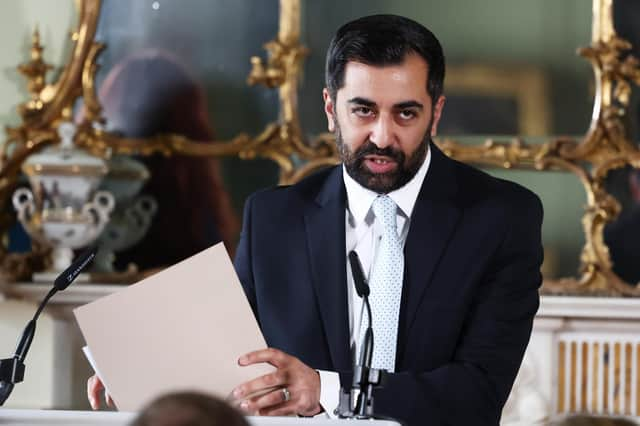Ceist mhòr a-nis mu choinneamh na h-Uainich


[English-language version below]
Chan eil e gu diofar sam bith a-nis, ach bha e duilich a dhèanamh a-mach dè an taobh dhan deigheadh na buill aca mas e agus gun deigheadh bhòt na h-ath mìosa air adhart am measg na 7,000 duine a tha nam ball aca.
Leis an SNP a’ ruighinn a’ cho-dhùnaidh dhan tàinig iad madainn an-dè, tha e a’ fàgail ceist mòire mu dè a-nis a tha fa-near don phàrtaidh agus do na ceannardan aca. Co-dhiù, tha e ciallachadh gu bheil an sgaradh air tachairt rudeigin luath, ged a thig gu leòr a dh’aimhreit leis fhathast, tha fhios.
Advertisement
Hide AdAdvertisement
Hide AdGu cinnteach, bidh gu leòr nach bi idir tàmailteach mas e ‘s gum falbh Pàdraig Harvie is Lorna Slater. Thathas a’ cur na coire orra airson grunn dhe na poileasaidhean as miosa a th’ air a bhith ann bho chionn ghoirid: sgeama tillidh nam botul; sgìrean fìor ghlèidhteachais mara, casg air stòbhaichean agus Achd Aithneachadh Gnè, a tha air an uimhir a' chonnspaid agus fearg agus sgaradh adhbhrachadh.
Bha na h-agallamhan a thug Pàdraig Harvie seachad an t-seachdain-sa nam fìor chomharran air na tha air a dhol ceàrr, agus carson.
Bha e ag iarraidh fuireach san riagaltas airson cùis na h-àrainneachd a phutadh air adhart, gur iad a b’fheàrr son sin a dhèanamh, agus tha sin cho reusanta ’s a ghabhas.
Ach an uairsin, ann am priobadh na sùla, dh’fhalbh an gliocas leis a’ ghaoith. Ged a tha e gu mòr airson coirichean coimhearsnachd an LGBQT a sheasamh, tha e duilich a dhèanamh a-mach carson a bha e a' smaoineachadh gun robh e ciallach ceist phearsanta fhàgail ma choinneamh neach-meadigeach proifiseanta, a thuirt ann an aithisg oifigeil, nach deach leigheas airson stad air inbhidheachd (puberty) a làimhseachadh gu ceart.
Tha e iomchaidh gu leòr beachd eadar-dhealaichte a thoirt seachad no an tuilleadh rannsachaidh iarraidh. Ach, a’ fàgail amharrais gun deach an obair seo a dhèanamh le droch-rùn, tha sin do-chreidsinneach dha ministear ann an Riaghaltas – dha-rìribh cunnartach nuair a smaoinicheas thu air na tha air a bhith a' cuairteachadh an deasbaid seo.
Tha e dìreach a’ sealltainn carson a tha an uimhir a’ smaoineachadh nach eil iad idir freagarrach airson a bhith ann an cumhachd.
Ach tha taobh air seo a tha tàmailteach cuideachd. Tha prìomh amas a’ phàrtaidh – an àrainneachd – fhathast cho cudromach ‘s a bha agus tha e duilich a thuigsinn carson a bha iad cho deònach seo a chur ann an cunnart airson cuspairean eile a tha cho connspaideach a-measg sùilean an t-sluaigh.
Mas e agus gun teich na h-Uainich air ais dhan dorachadas, ‘s iad fhèin as coireach. A thaobh dè a tha e ag ràdh mu fhallaineachd poileataigs na h-Alba san fharsaingeachd, ‘s e tha sin ach rud eile.
English-language version:
In the end it was pretty inevitable. The fabled Bute House Agreement, which brought Patrick Harvie and Lorna Slater into government, looked increasingly doomed from the moment it was clear that a significant slice of their party membership were unhappy at the continuation of a formal coalition, with the rowing back of the 2030 climate targets seemingly being the final straw for many.
It may be all academic now, but it was difficult to tell which way the rank and file of Scottish Greens would have swung had the vote gone ahead next month. With their hand being forced in any case, it does leave a major question mark as to what now for the party and its leadership.
Pulled asunder from the more dogmatic elements of the green membership on one side and the traditionalists from the SNP on the other, the agreement was never likely to last and the pre-emptive decision by Humza Yousaf just circumvents the possibility of a prolonged and messy divorce, though fallout there will certainly be.
The Harvie-Slater double act (it was no comedy) was left carrying the can for the more controversial policies and failures to emerge from Holyrood in recent years. And it’s quite a list: deposit return scheme, highly protected marine areas, solid fuel stove ban for new homes, and, of course, the gender recognition bill, which has been mired in controversy and rancour.
Patrick Harvie’s recent appearance on the recent the BBC Scotland Sunday Show encapsulated the situation perfectly. Appealing for them to continue in government, he said there was a need to double down on climate action and that he and his colleagues were best placed to make sure that happens. So far, so entirely expected and, indeed, reasonable.
But, then almost within the same breath, sensibility flew out of the window. Even given his stance as a social libertarian and staunch equality campaigner for LGBQT people, it was completely unnecessary to leave questions circulating over the reputation of a respected medical professional just because she came to a conclusion on puberty blockers that did not suit his own agenda. But more than that, it was highly irresponsible.
He is quite entitled to hold an opposing view or even to call for more research, but to give credence to the theory that the report was ideologically driven was reckless in the extreme for any government minister, considering the backdrop of anger that surrounds the issue. As with the practical application of their policies, it shows how, despite their own pleadings, they are unsuited to the wider responsibilities that come with power.
There will be many who will be cock-a-hoop at the prospect of their retreat from the frontline, but the sadness of it is that the central purpose for their existence – environmental issues – remain as pertinent as ever. Quite why they were prepared to sacrifice that crucial and vital raison d'etre by pursuing other issues of a highly controversial nature is a mystery. And what all this says about the state and the future of Scottish politics in general, goodness only knows.
Comments
Want to join the conversation? Please or to comment on this article.